Three out of five politicians’ websites lack basic HTTPS encryption, according to a new study by Comparitech.
Comparitech assessed the personal websites of more than 7,500 politicians in 37 countries across the globe. Of those websites, 60.75 percent did not use valid SSL certificates, meaning visitors’ connections to those sites are not private nor secure.
About half of politicians websites include some sort of form input where users can register accounts, log in, sign up for newsletters, or send a message. These forms often request the user enter personal information, such as name, or email address. None of these interactions can be properly protected without HTTPS.
Security experts unanimously agree that any website asking for user input should be secured with HTTPS. Even websites that don’t include form input fields should ideally use HTTPS to encrypt the contents of what users see on a particular site.
HTTPS encrypts data in transit so that unauthorized third parties cannot intercept and decipher it. Valid SSL certificates also authenticate websites, helping to ensure voters that they’re on the politician’s genuine site and not a fraudulent one.
Obtaining an SSL certificate and implementing HTTPS is not difficult nor expensive so politicians have little excuse for not properly securing their sites.
Below you can view the country-by-country breakdown of the 37 countries we analyzed. Note we only looked at politicians’ personal and campaign websites and not government-run or party-run sites:
Key findings
The top five countries with the lowest percentage of websites lacking HTTPS:
- United States – 26.22% of politicians’ websites were not secure
- United Kingdom – 30.65% of politicians’ websites were not secure
- Germany – 31.92% of politicians’ websites were not secure
- Australia – 37.44% of politicians’ websites were not secure
- Denmark – 41.3% of politicians’ websites were not secure
The bottom five countries with the highest percentage of websites lacking HTTPS:
- South Korea – 92.31% of politicians’ websites were not secure
- Poland – 91.16% of politicians’ websites were not secure
- Hungary – 90.91% of politicians’ websites were not secure
- Canada – 86.25% of politicians’ websites were not secure
- Malta – 86.21% of politicians’ websites were not secure
Politicians in developing countries are more likely to have personal websites without HTTPS (74.98%) versus those in developed countries (64.46%).
This map shows countries with a higher percentage of unsecured politicians’ websites in darker red:

Why is HTTPS important?
Websites should get valid SSL/TLS certificates and implement HTTPS for two main reasons:
- It encrypts web traffic between the website and user
- It verifies the authenticity of the site, so the user knows they are on the legitimate site and not a fake
Without HTTPS, users are at risk of snooping by third parties and man-in-the-middle attacks, especially when entering information on a website. Internet service providers, government agencies, and hackers could plausibly intercept, read, and even modify data in transit between the user’s web browser and the web server.
Information at risk includes:
- Any info you enter into the website, such as name, email address, password, and/or payment info
- What pages you visit and their contents
- Information about your device and web browser
Furthermore, HTTPS shows the user that they are on the genuine politician’s site and not a fake or duplicate phishing site.
Getting an SSL certificate and implementing HTTPS is not difficult thanks to certificate authorities like Let’s Encrypt, Cloudflare, and Comodo. If you want to learn more about the technical aspects of how HTTPS works, check out our guide to SSL/TLS encryption.
Country summaries
Country # of politicians # of websites % of politicians with websites No. of politicians' websites without HTTPS % of politicians' websites without HTTPS
Japan 839 824 98 597 72.45%
Poland 619 441 71 402 91.16%
Canada 329 320 97 276 86.25%
France 927 578 62 268 46.37%
Brazil 608 316 52 237 75.00%
Italy 363 313 86 233 74.44%
Turkey 379 251 66 210 83.67%
Germany 696 639 92 204 31.92%
UK 656 620 95 190 30.65%
India 887 217 24 182 83.87%
US 595 573 96 150 26.22%
Finland 201 189 94 133 70.37%
Czech Republic 288 157 55 123 78.34%
Greece 348 158 45 112 70.89%
Indonesia 766 149 19 105 70.47%
South Korea 316 104 33 96 92.31%
Hungary 209 99 47 90 90.91%
Spain 195 138 71 90 65.22%
Belgium 200 150 75 85 56.67%
Argentina 330 114 35 83 72.81%
Australia 227 211 93 79 37.44%
Colombia 294 99 34 76 76.77%
Ireland 193 94 49 69 73.40%
Romania 489 91 19 63 69.23%
Austria 286 105 37 62 59.05%
Malaysia 341 85 25 59 69.41%
Sweden 378 111 29 51 45.95%
Nigeria 490 69 14 49 71.01%
Denmark 191 92 48 38 41.30%
Lithuania 154 38 25 32 84.21%
Philippines 334 44 13 30 68.18%
Slovakia 164 36 22 27 75.00%
Peru 149 34 23 26 76.47%
Malta 79 29 37 25 86.21%
Estonia 117 31 26 19 61.29%
Netherlands 236 40 17 19 47.50%
Luxembourg 78 20 26 14 70.00%
Total 13951 7579 54.33% 4604 60.75%
Argentina
Just less than half of the politicians we researched had personal websites. Others simply had a listing on the Directory of Legislators so weren’t included in the final scoring.
83/114 personal websites were insecure = 72.81%
Of the bigger parties, the worst-performing party was FPV (79.55%), closely followed by UCR (75%). The best-performing party was PRO (57.14%).

Australia
The vast majority of Australian politicians have websites with their own domains.
79/211 personal websites were insecure = 37.44%
The worst-performing party with 14/25 (56%) websites being insecure was the LNP. Best performing parties (except those with only a few members) were the Labor Party with 33/88 websites being insecure (37.5%) and the Liberals with 22/64 (34.38%) of websites being insecure.

Austria
Around a third of politicians have their own website.
62/105 of these personal websites were insecure = 59.05%
The worst-performing party was Green (75%). The best-performing party was NEOS (37.5%).
56.82% of OVP sites were not secure.

Belgium
Over half of politicians have a website.
85/150 of these are insecure = 56.67%
The best-performing parties were the sp.a and Vuye&Wouters, who had zero insecure sites. The worst-performing parties were Vlaams Belang, Partie Populaire and LDD at 100%.
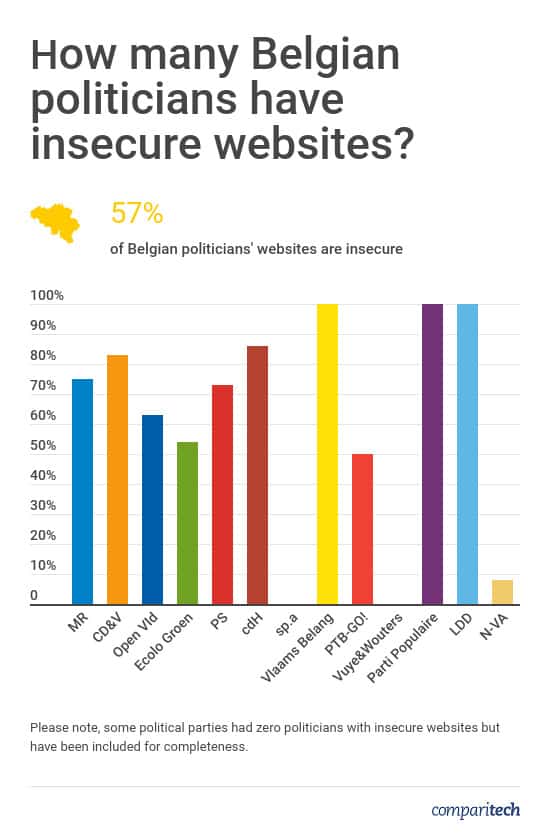
Brazil
Around 50% of politicians have their own website.
237/316 of these are insecure = 75%
Looking at the bigger parties, the worst-performing was PSB (88.24%), and the best-performing was SD (50%).
The PT had the most sites; 34 out of 42 (80.95%) were not secure.

Canada
The majority of politicians have their own websites.
276/320 of these are insecure = 86.25%
Of the bigger parties, the worst-performing was the NDP (95.12%), and the best-performing party was Conservative (68.89%).
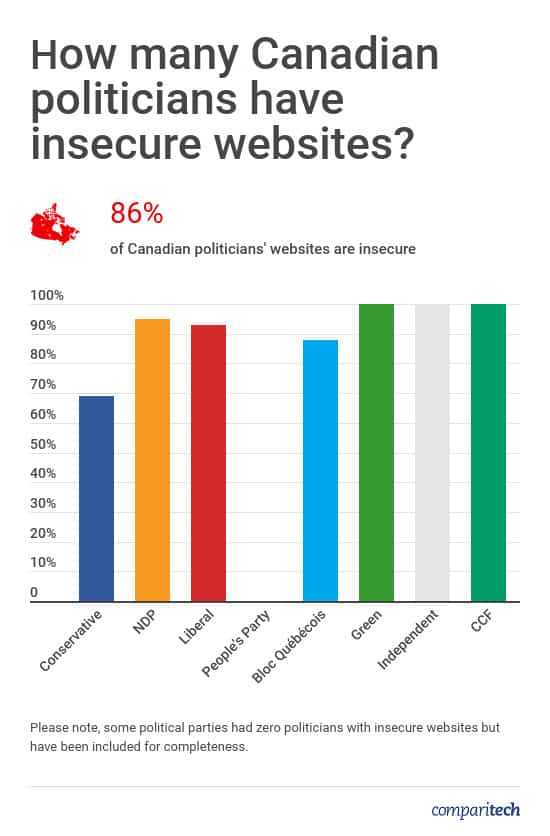
Colombia
Around a third of politicians have their own websites.
76/99 of these are insecure = 76.77%
Of the bigger parties, the worst-performing was Conservative (88.89%) and the best-performing were Radical Change and Green Alliance (76.92%).
87.5% of Liberal politicians’ websites were not secure.
72% of Democratic Center politicians’ sites did not use HTTPS.
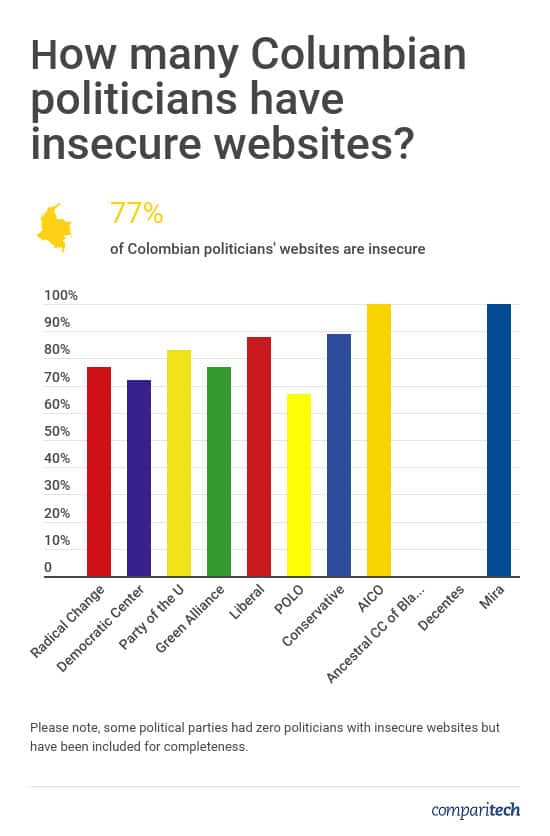
Czech Republic
Around half of politicians have their own websites.
123/157 of these are insecure = 78.34%
Of the bigger parties, the worst-performing was KDU-CSL, all of whom had insecure websites (100%). The best-performing party was ANO (74.07%).
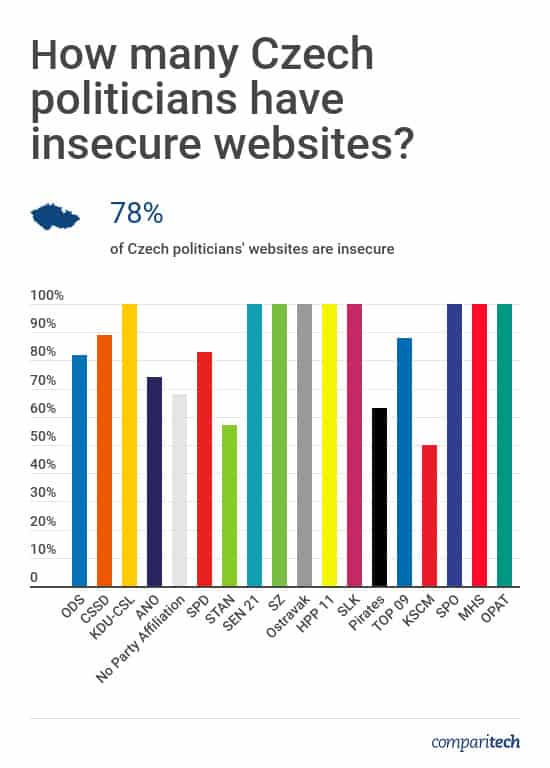
Denmark
Around half of politicians have their own websites.
38/92 of these are insecure = 41.30%
Of the bigger parties, the Danish People’s party had no secure websites (100%), while the Conservative People’s party was very secure in contrast (14.29%).
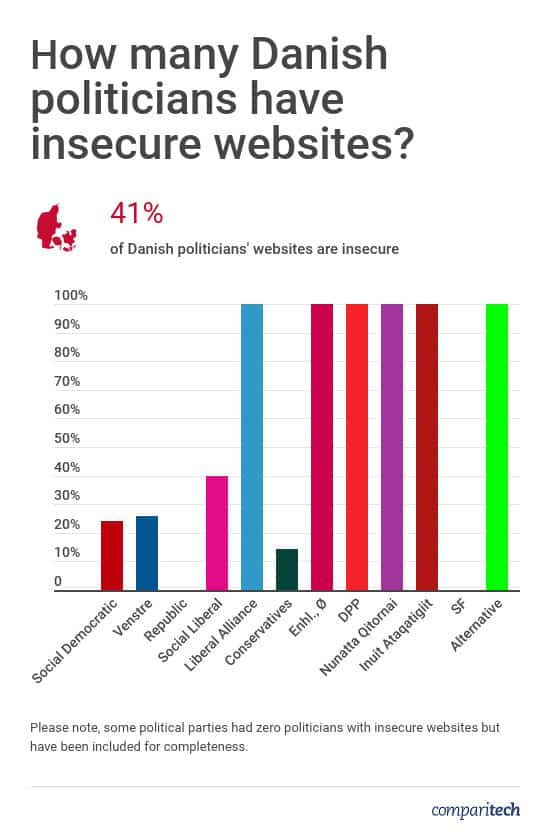
Estonia
Around a quarter of politicians have their own websites.
19/31 of these are insecure = 61.29%
Pro Patria and Estonian Free Party politicians had no secure websites (100%). The best-performing of the larger parties was the Reform Party (25%).

Finland
The majority of politicians have their own websites.
133/189 of these are insecure = 70.37%
Of the bigger parties, the Left Alliance didn’t have any secure websites, while the Finns secured about half of their sites (52.94%).
Centre politicians secured 64.44% of their sites.

France
Just over half of politicians have their own websites.
268/578 of these are insecure = 46.37%
Of the bigger parties, the worst-performing was Socialistes et Apparentes (69.57%) and the best-performing party was Communiste Républicain Citoyen et Écologiste (23.08%).
Les Républicains failed to secured 57.04% of their personal sites, while La République En Marche failed to secure 36.76% of theirs.
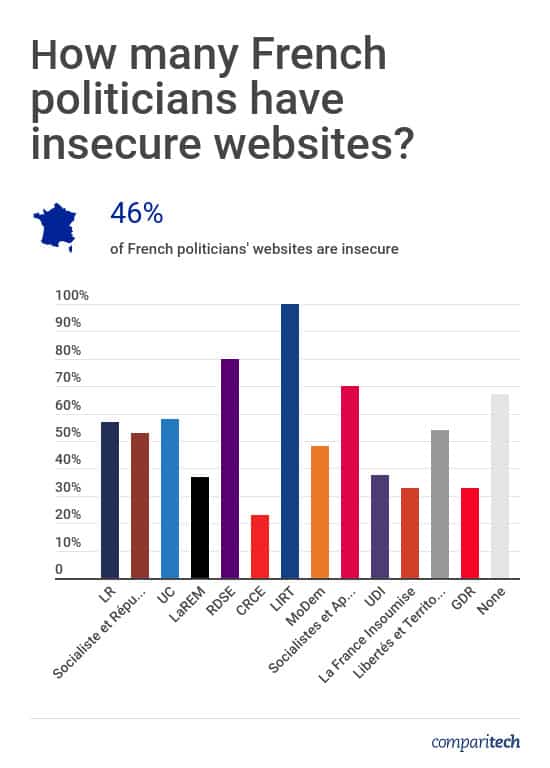
Germany
Most politicians have their own websites.
204/639 of these are insecure = 31.92%
The worst-performing party was AfD (40%) and the best-performing party was FDP (16.22%).
CDU/CSU members didn’t secure 32.03% of their sites, while the SPD didn’t secure 33.11%.

Greece
Almost half of politicians have their own websites.
112/158 of these are insecure = 70.89%
Of the biggest parties, New Democracy performed the worst (85.19%) and Coalition of the Radical Left scored the best (61.76%).

Hungary
Around half of politicians have their own websites.
90/99 of these are insecure = 90.91%
Worst-performing parties were LMP, KDNP, and DK, none of which used HTTPS on any of their sites (100%). The best-performing party was MSZP (0%), though it only has 1 member with a website.
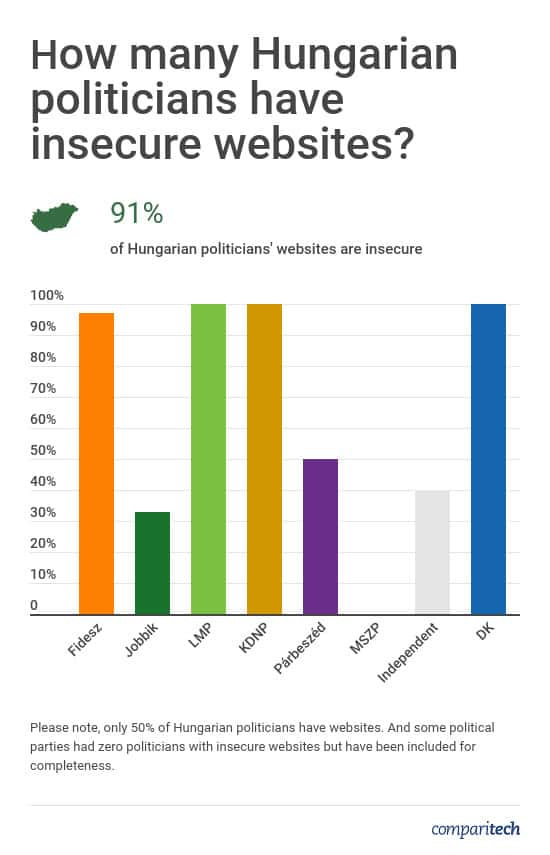
India
Around a quarter of politicians have their own websites.
182/217 of these are insecure = 83.87%
Of the biggest parties, Shiv Sena performed the worst (88.89%), while Indian National Congress performed best (73.91%).
Bharatiya Janata members failed to secure 84.62% of their personal sites.
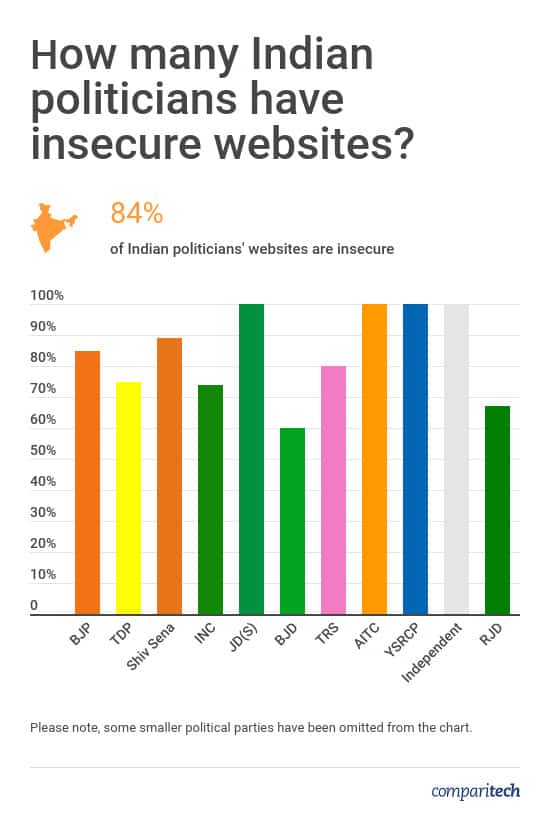
Indonesia
Around a fifth of politicians have their own websites.
105/149 of these are insecure = 70.47%
Of the biggest parties, the worst-performing was the Great Indonesia Movement Party (92.31%), and the best-performing was the National Awakening Party (47.06%).

Ireland
Around half of politicians have their own websites.
69/94 of these are insecure = 73.40%
The worst-performing party was Fine Gael (76.74%) and the best-performing party was Fianna Fáil (62.07%).
Sinn Féin members failed to secure 75% of their sites.

Italy
Nearly all politicians have their own websites.
233/313 of these are insecure = 74.44%
Of the biggest parties, Brothers of Italy performed worst (81.48%) and the Five Star Movement performed best (63.64%).
76.06% of Democratic party politicians’ sites and 70.45% of Forza Italia sites were not secured.

Japan
Nearly all politicians have their own websites.
597/824 of these are insecure = 72.45%
Of the biggest parties, the Japanese Communist Party scored worst (85.45%) and the Democratic Party for the People scored best (62.71%).
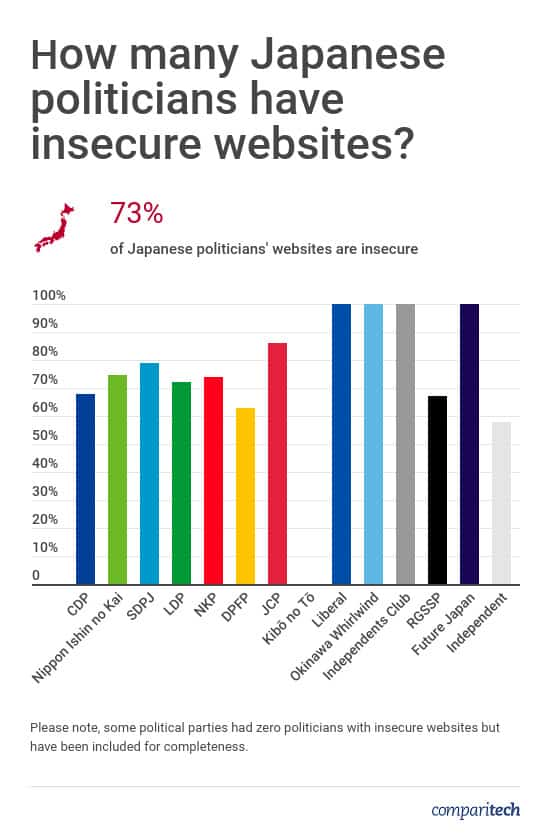
Lithuania
Around a quarter of politicians have their own websites.
32/38 of these are insecure = 84.21%
Of the biggest parties, Homeland Union scored worst (86.67%) and the Lithuanian Farmers and Green Union scored best (80%), although not much better.

Luxembourg
Around 25% of politicians have their own websites.
14/20 of these are insecure = 70%
Of the bigger parties, the worst-performing party was the Christian Social People’s Party (CSV), which had zero secure sites (100%). The best-performing party was the Socialist Party (33.33%).
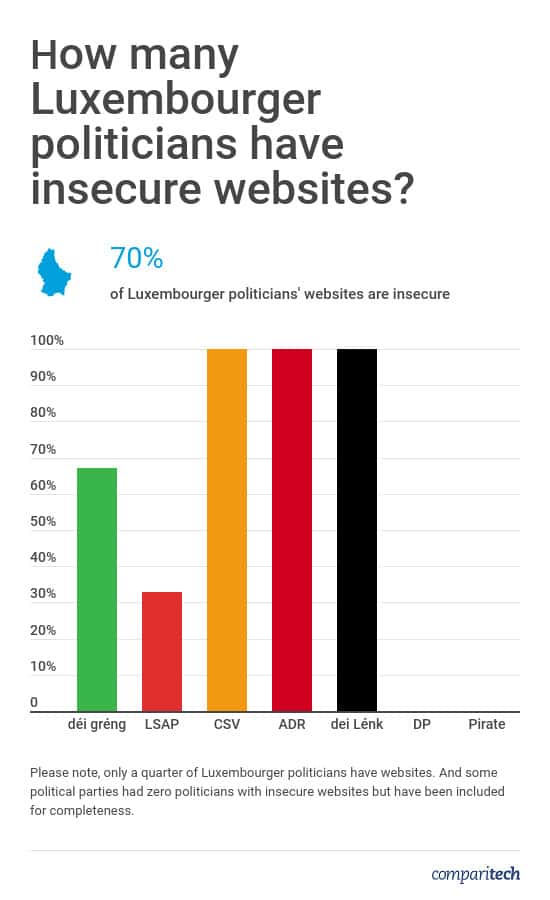
Malaysia
Around a quarter of politicians have their own websites.
59/85 of these are insecure = 69.41%
Of the biggest parties, PKR performed worst (73.91%) and AMANAH did best (50%).

Malta
Over a third of politicians have their own websites.
25/29 of these are insecure = 86.21%
Labour rarely secured its websites (94.74%), while the Nationalist party scored marginally better (70%).
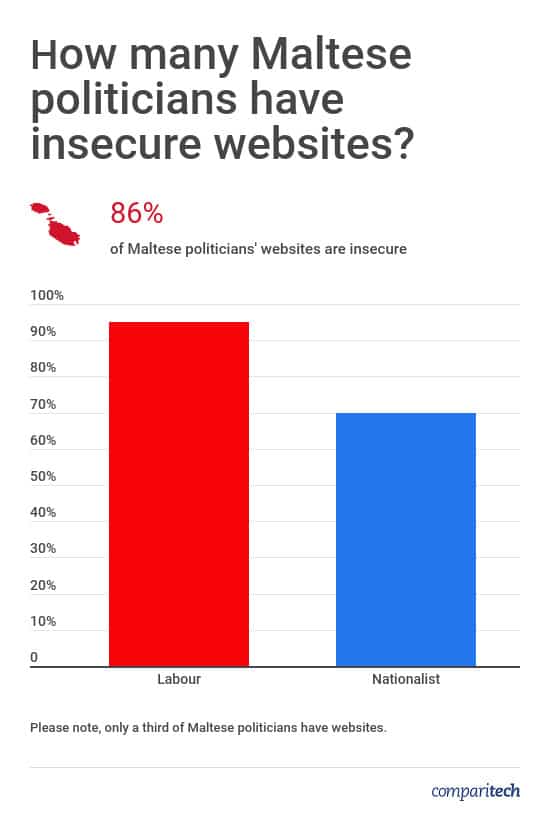
Netherlands
Around a fifth of politicians have their own websites.
19/40 of these are insecure = 47.50%
The worst-performing parties only had one member each who didn’t secure their websites: FvD and PvdA (100%). The best-performing party was VVD (27.78%).

Nigeria
Around 14% of politicians have their own websites.
49/69 of these are insecure = 71.01%
Of the biggest parties, APC scored worst (78.95%) while PDP scored best (63.64%).
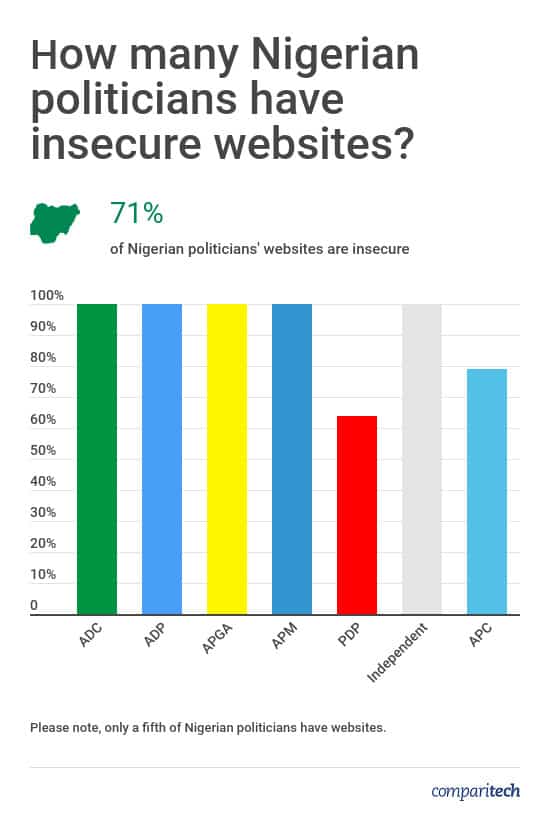
Peru
Around one-fifth of politicians have their own websites.
26/34 of these are insecure = 76.47%
Worst-performing parties included Accion Popular, Alianza Para El Progreso and Célula Parlamentaria Aprista, each of which only had one or two members with websites that were not secured (100%).
The best-performing party was Bancada Liberal (0%), which only had one member in the list.

Philippines
Around one-seventh of politicians have their own websites.
30/44 of these are insecure = 68.18%
Worst-performing parties included Lakas, LDP, NUP, and UNA. Each had only one to four members with websites and none used HTTPS (100%).
Best-performing parties were Akbayan and PDP-Laban (50%). Each had only 2 members with websites.
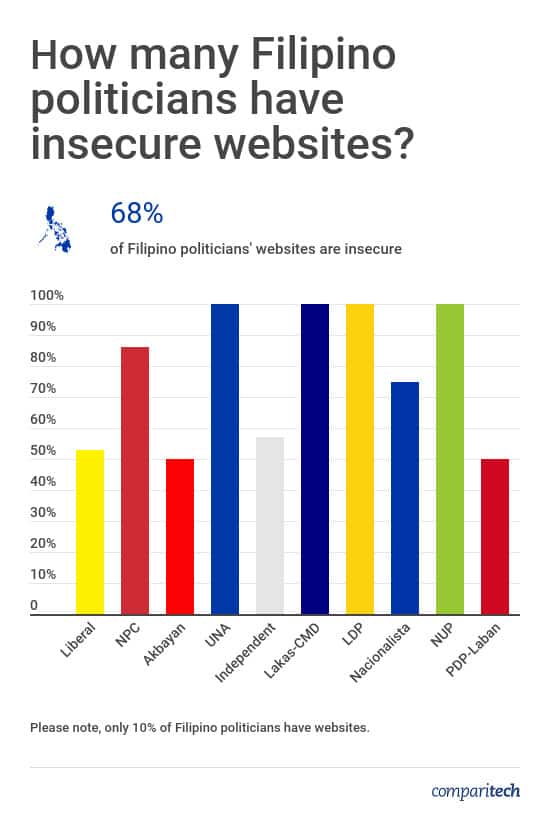
Poland
Around three-quarters of politicians have their own websites.
402/441 of these are insecure = 91.16%
Of the biggest parties, the worst performing was the Civic Platform (92.25%). But the best performer, the Law and Justice Party, didn’t do much better (91.28%).

Romania
Around one-fifth of politicians have their own websites.
63/91 of these are insecure = 69.23%
Of the biggest parties, PSD performed worst (75%), while the non-affiliated politicians (neafiliati) did best (50%).
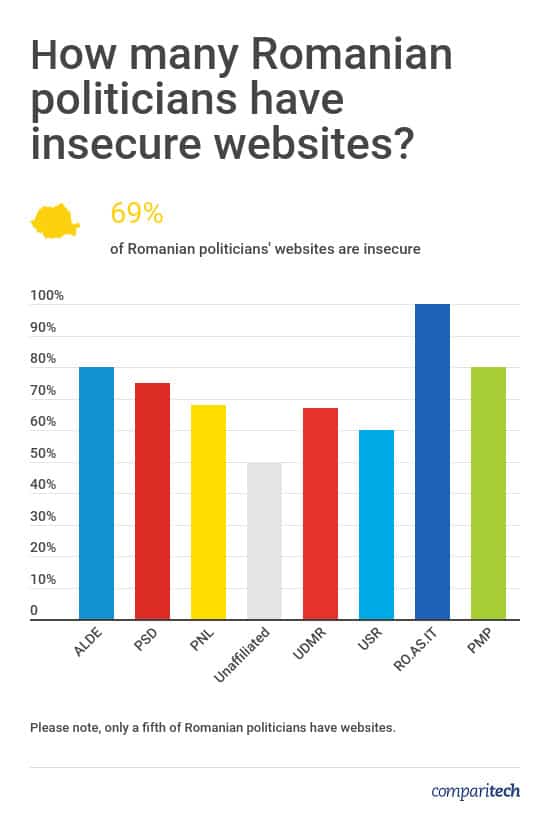
Slovakia
Around one-fifth of politicians have their own websites.
27/36 of these are insecure = 75%
Of the biggest parties, Freedom and Solidarity performed worst (73.33%). We Are Family scored the best but only had 1 member with a website (0%).
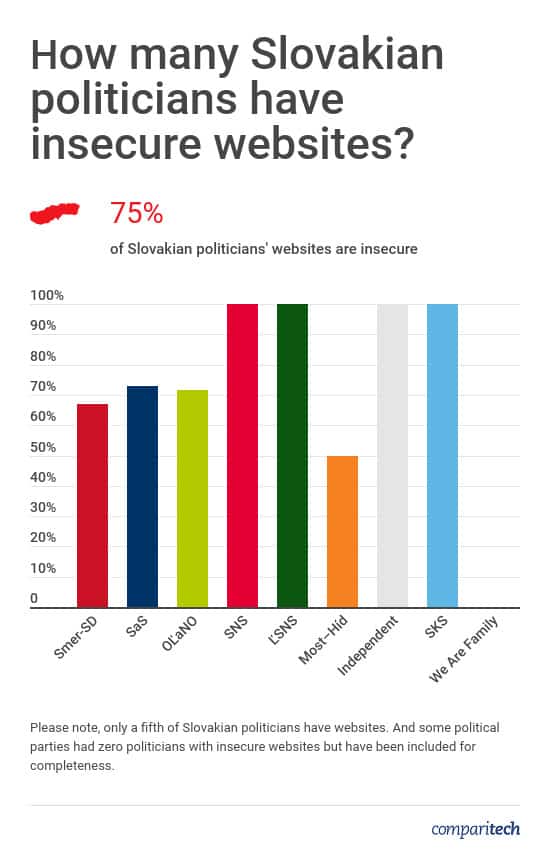
South Korea
Around one-third of politicians have their own websites.
96/104 of these are insecure = 92.31%
Of the biggest parties:
The Liberty Korea Party had no secure personal websites (100%).
Bareunmirae Party passed a low bar to be the best performer (92.86%).
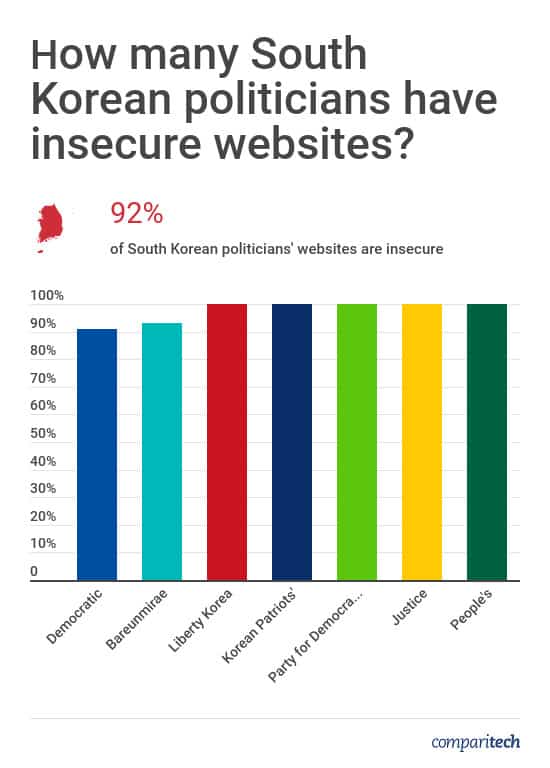
Spain
Around three-quarters of politicians have their own websites.
90/138 of these are insecure = 65.22%
Of the bigger parties, Unidos Podemos scored the worst (58.33%), and the PSOE did best (53.13%). The People’s Party failed to secure 57.58% of its members’ websites.
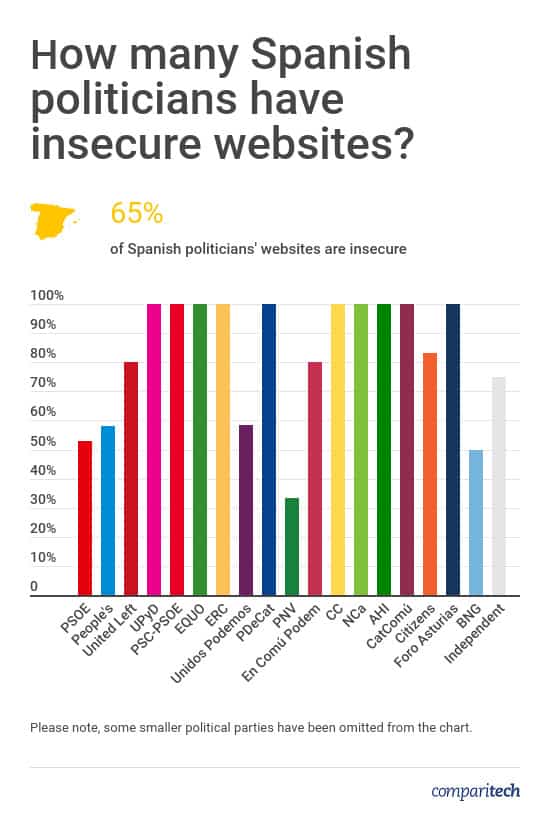
Sweden
Around one-third of politicians have their own websites.
51/111 of these are insecure = 45.95%
Social Democrats performed the worst (50%) and Sweden Democrats did the best (25%). The Moderate Party secured 30.56% of its members’ sites.
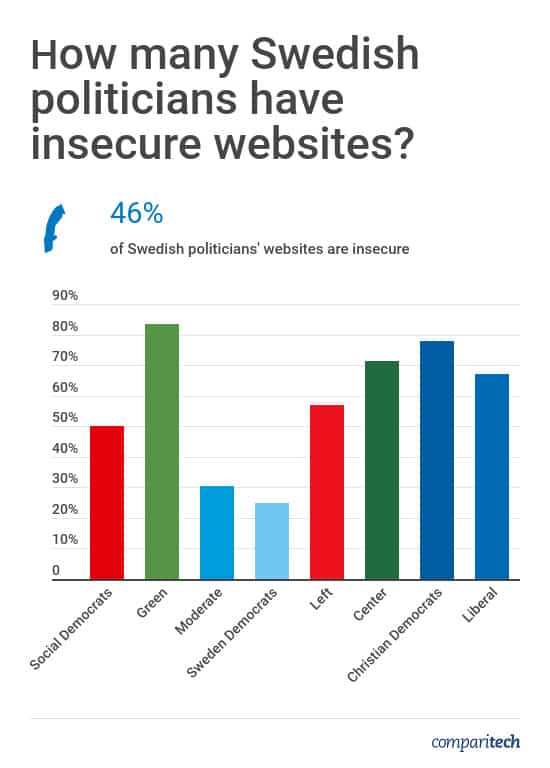
Turkey
Around two-thirds of politicians have their own websites.
210/251 of these are insecure = 83.67%
Of the biggest parties, Justice and Development Party (AK) performed worst (85.34%), but it was only slightly outdone by the best performer, the Good Party (İyi Parti) (80%).
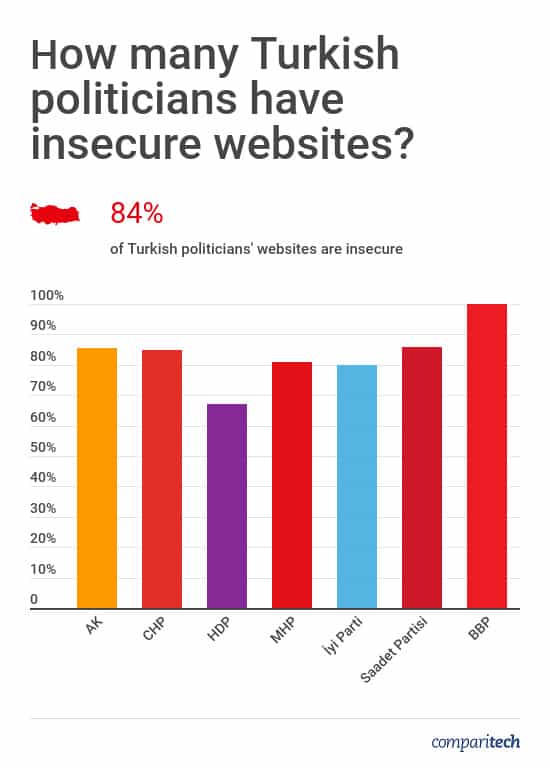
UK
Nearly all politicians have their own websites.
190/620 of these are insecure = 30.65%
The Scottish National Party scored worst (52.94%) among the larger parties while Conservatives earned the top spot (18.95%). Labour secured 38.27% of its members’ websites.
Within the newly-formed Independent Group, 45.45% of members have insecure websites.
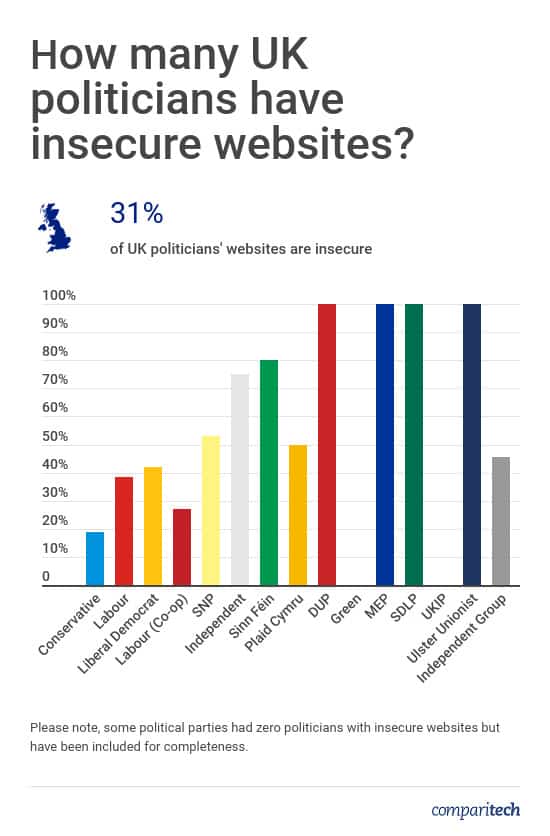
US
Nearly all politicians have their own websites.
150/572 of these are insecure = 26.22%
Republicans were least likely to secure their personal websites (27.11%) while Independents, with only three politicians in the list, all secured their sites (0%).
Of the Democrats, 25.68% of its members had insecure websites.

Limitations & Additional notes
Data was collected between November 2018 and the date of publishing. You can view the full dataset here. Some websites might have upgraded to HTTPS since our research concluded and some might have been taken down entirely. We gathered data from 72 countries in total, but we were only able to find enough websites for the 37 countries listed above.







